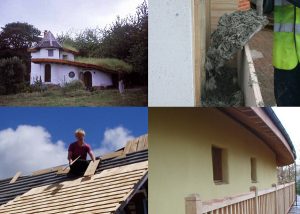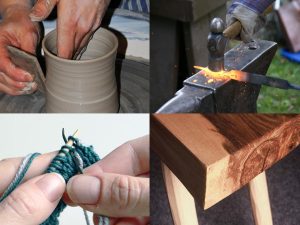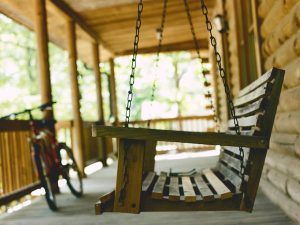There’s an approach to life that sees craft jobs, or smallholding and food production, including baking, brewing and beekeeping, as well as any kind of job that involves manual work and dexterity as somehow retrograde and passé, and that ‘work’ now means mainly putting on a suit and travelling to an office to do something-or-other in sectors such as finance, advertising, sales, fashion or PR. Failing that – something in an Amazon warehouse, an Über car or a telesales booth. I don’t think this is true at all. From the hundreds of conversations I’ve had with people doing this kind of work in London, a large proportion of them feel trapped, and would jump at the chance to be a smallholder, natural builder, market gardener, renewables installer, potter, textile maker, woodworker or any other kind of craftsperson.
This kind of work can provide the autonomy, creativity, beautiful surroundings, problem-solving and fulfilment that’s good for physical and mental health, as well as the satisfaction of provisioning our communities with healthy food, healthy buildings, clean energy and durable, quality products. There’s a virtual epidemic of mental health problems at the moment. There are several reasons for this, but we humans need autonomy, fulfilling work, creativity and personal interactions in a supportive community for mental health – things that a new, community-based economy can provide, that are sadly lacking from the current economy.

I’m not saying that it would be for everyone – some people are definitely more suited to the banking sector or the fashion world. But for those that it does suit, the barrier is price. The question is: how will I produce things at a price that won’t be blown out of the water by corporate imports from the Far East, that are more-or-less untaxed, and produced using slave labour? This problem can be solved by committing to purchase from each other – to be each other’s customers. Put simply, what does it matter if the bread that he bakes is expensive, the natural extensions that she builds are expensive, and the furniture that I make is expensive? If we all commit to trade with each other, then we all get quality products and services and we all make a good income. This can be as true in Indonesia, for people currently working in terrible conditions in corporate sweatshops as it can in suburban London or working-class towns in the north of England. And it can be as true for co-operatives producing energy, housing, food, social care and cycle couriering (is that a word?) as it can for sole traders.
It will involve a shift in thinking. Rather than thinking of ourselves as consumers (usually from giant, extractive corporations), we move towards becoming producers as well as consumers – ‘prosumers’, if you like. As consumers, we’re looking for the cheapest price possible. But there are problems with suspiciously cheap stuff – whether we’re talking about household goods, clothes, food, buildings or electricity. Those problems can include:
- someone being exploited somewhere – often via virtual slave labour with no employment rights;
- goods being transported from the other side of the world;
- environmental considerations being ignored;
- low-quality goods that don’t last long and end up in landfill;
- profits being sucked out of your community to pay corporate shareholders;
- tax avoidance by those same corporates.
It’s a downward spiral that harms almost everyone. Whereas, if we build communities of small businesses producing goods that are affordable precisely because we are ‘prosumers’, benefits can include:
- goods provided by autonomous producers receiving reasonable prices in good working conditions;
- locally-produced goods;
- environmentally-friendly production;
- everyone gets high-quality, durable products;
- profits stay in communities;
- small producers pay tax properly;
This is an upward spiral that shouldn’t be beyond a species that can fly helicopters on Mars.

The ideal exchange medium for this new, mutually-owned, decentralised, healthy and nurturing economy is without a shadow of a doubt, mutual credit – especially if money is in short supply when the effects of Covid lockdowns really kick in.
Every community in the world can support a basketmaker, a potter, a soap-maker, a candle-maker, a beekeeper, a cheesemaker, a leatherworker, a couple of bakers and brewers, and several natural builders, clothes-makers, furniture-makers renewables installers, entertainers and independent restaurants – and if enough people want to do it, then we can support them, by commiting to buy from them. One day, they might return the favour. Then there’s the co-op sector, also mainly community-based. Every community can also support a social care co-op, a cycle courier co-op, a community energy scheme, a community-supported agriculture scheme and several worker co-ops and housing co-ops; and, of course, a mutual credit club. These trades, co-ops and definitely the mutual credit clubs, can be federated from the town level to the county, national and international level.
Collaboration is hard, but I think the vast majority of the population support this kind of economy – as long as they can be self-employed and left alone if they want to be. There will need to be some re-skilling, but that’s available, and there will be (already is in fact) an army of people recently laid off with a redundancy payment that they’re wondering how to use. At Lowimpact.org, we’re in contact with networks of talented people who are building community energy, CSA, cohousing, social care and transport co-ops; plus people building natural homes, installing renewable energy, providing local, organic food and quality craft products. These can all be federated to the national level and beyond, by using mutual credit as our exchange medium.

Mutual credit:
- can’t be siphoned out of communities and dumped into tax havens;
- works when there’s no money around;
- doesn’t require interest or banks;
- is owned by us, in communities.
We’re also working with the people who are building mutual credit clubs and federating them so that they can inter-trade. Some sectors will be easier to network than others, but let’s go for the low-hanging fruit first, and incorporate the harder-to-get trades later. Do talk with us, and we’ll provide you with information on how and when you could join, to help build this new, community-based economy.
Over the coming months, I’m going to be talking with makers, fixers, growers, builders, installers and other ‘prosumer’-type trades about how to leave corporate jobs and re-skill to become a sole trader or even to get together with like-minded people to form a co-op to provide useful, high-quality products and services for our communities. This will evolve to become a new resource for Lowimpact – a career-change guide for as many of our 230+ topics as possible. Here are a few to start with (although future interviews will include a video too):
- Natural builder
- Basketmaker
- Dry stone waller
- Smallholder
- Crofter
- Horse logger
- Charcoal maker
- Soap maker
- And here are some tips for running a market stall.

















